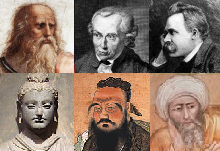| 系列條目 |
| 哲學 |
|---|
 |
| 哲學家 |
| 傳統 |
| 時期 |
| 文獻 |
| 分支 |
| 列表 |
| 雜項 |
分析哲學(英語:analytic philosophy或analytical philosophy),一種哲學分支與傳統,強調語言清晰,邏輯嚴謹,與歐陸哲學相反。[1]分析哲學自二十世紀初至今,仍是英文國家的大學哲學系主流,包括英國、美國、澳大利亞等。[2][3]
現代發展
邏輯原子論
英國學者維根斯坦1921年,發表《邏輯哲學論》,提出語言可以表達,就可以表達清楚。全部有認知意義的語句都有邏輯形式及真假值,而複雜語句可以分拆成更簡單的語句。[4]
日常語言哲學
二戰後,維根斯坦拋棄邏輯原子論,其《哲學研究》轉向日常語言哲學,認為語言本身的意思並不重要,人亦不應該探究語言應該如何使用才是正確,反而語言是觀察,人怎樣用語言,語言就有什麼意思,「意義即用法」。[5]羅素依然堅持邏輯原子論,並認為日常語言哲學是荒謬。
後設倫理學
G.E.摩爾在1903年發表《倫理學原理》,以語義探究倫理學,開創後設倫理學。G.E.先生探究倫理學的概念「好」(good),但他無法將這概念等同於任何經驗事實(例如他不認同「好」是等於「令人開心」),而認為「好」是不可定義,並且認為自然主義是有謬誤。[6]
A.J.艾耶《語言、真理與邏輯》1936年提出情緒主義,用邏輯實證主義檢驗原則否定倫理學,認為道德價值「好」,不可以用經驗檢證,而道德句子表達出情緒,但並無認知意義,非真亦非假。[7]不過,21世紀已有哲學家質疑邏輯實證主義基礎。林火旺指出,艾耶情緒主義的論證基礎有問題。艾耶情緒主義的論證基礎是「檢證原則」,但「檢證原則」不可以檢證出「檢證原則」本身。因為「檢證原則」主張有意義的命題,如果不是分析命題,就是可以檢證的綜合命題。當「檢證原則」嘗試檢證「檢證原則」本身,就會得出「檢證原則」本身是沒有認知意義[8]。
認識論
美國哲學教授葛梯爾1963年提出葛梯爾問題,研究「知」的定義,什麼情況人才算「知」。他疑惑,如果論證前提全部是假,但恰巧結論是真,那人算不算知道結論。[9]
代表性人物
參見
參考資料
- ↑ "Without exception, the best philosophy departments in the United States are dominated by analytic philosophy, and among the leading philosophers in the United States, all but a tiny handful would be classified as analytic philosophers. Practitioners of types of philosophizing that are not in the analytic tradition—such as phenomenology, classical pragmatism, existentialism, or Marxism—feel it necessary to define their position in relation to analytic philosophy." John Searle (2003), Contemporary Philosophy in the United States in N. Bunnin and E. P. Tsui-James (eds.), The Blackwell Companion to Philosophy, 2nd ed., (Blackwell, 2003), p. 1.
- ↑ See, e.g., Avrum Stroll, Twentieth-Century Analytic Philosophy (Columbia University Press, 2000), p. 5: "[I]t is difficult to give a precise definition of 'analytic philosophy' since it is not so much a specific doctrine as a loose concatenation of approaches to problems." Also, see Stroll (2000), p. 7: "I think Sluga is right in saying 'it may be hopeless to try to determine the essence of analytic philosophy.' Nearly every proposed definition has been challenged by some scholar. [...] [W]e are dealing with a family resemblance concept."
- ↑ See Hans-Johann Glock, What Is Analytic Philosophy (Cambridge University Press, 2008), p. 205: "The answer to the title question, then, is that analytic philosophy is a tradition held together both by ties of mutual influence and by family resemblances."
- ↑ Ludwig Wittgenstein. Tractatus Logico-Philosophicus.
- ↑ Wittgenstein, Ludwig (2001) [1953]. Philosophical Investigations. Blackwell Publishing
- ↑ Warnock, Geoffrey. Honderich, Ted , 編. The Oxford Companion to Philosophy. Oxford: Oxford University Press. 1995: 585. ISBN 0-19-866132-0.
- ↑ Ayer, A. J. (1952) [1936]. "Critique of Ethics and Theology". Language, Truth and Logic. New York: Dover Publications. ISBN 0-486-20010-8.
- ↑ 林火旺. 《倫理學》. 臺灣: 五南. 2004: 199. ISBN 9789571135090.
- ↑ Gettier, Edmund, Is Justified True Belief Knowledge? (PDF), Arguing About Knowledge (Routledge), 2020-07-15: 14–15, ISBN 978-1-003-06103-8, doi:10.4324/9781003061038-5